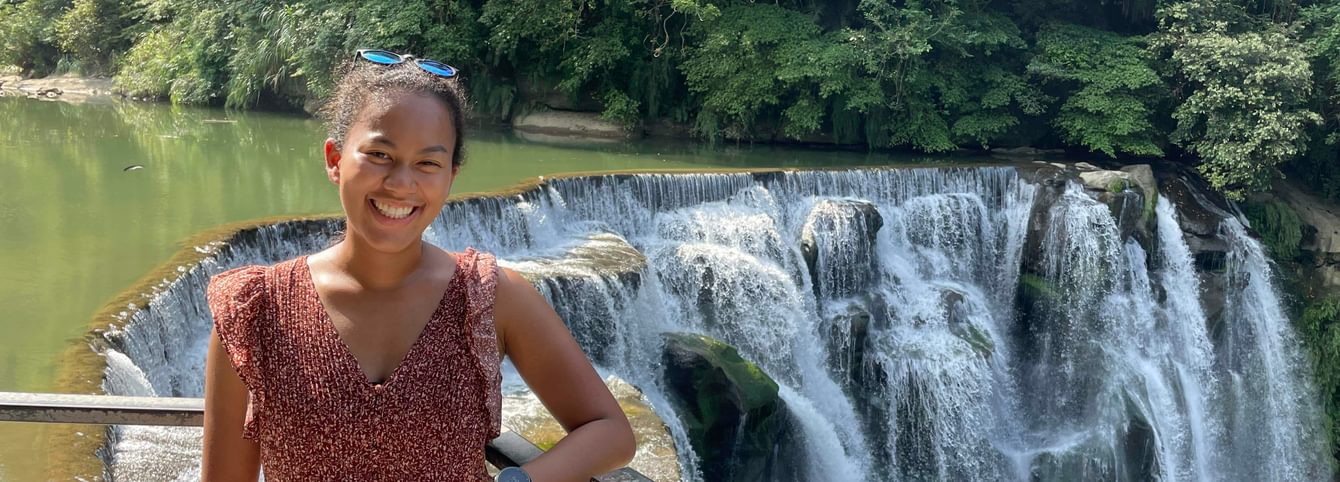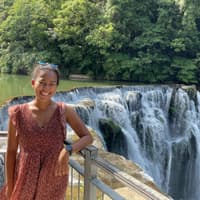Kana Cummings
Kana Cummings is an alumna of the 2022 CLS Chinese Program hosted by National Cheng Kung University in Tainan, Taiwan. Kana is an Associate at the Boston Consulting Group (BCG) in the firm’s Chicago office. She recently graduated from Stanford University with a Bachelor of Arts in Sociology (Data Science, Markets and Management), a minor in Economics, and a Proficiency Notation in Mandarin Chinese. Kana hopes to work in the food sustainability field and serve as a bridge between markets in the U.S. and East Asia.
Getting to Know Kana
I was born and raised in the suburbs of Cleveland, Ohio, but went to college in Northern California, and recently moved to Chicago for work. My hobbies include distance running, reading, cooking (and eating), and of course, language learning! My mother is Korean-Japanese and growing up I attended Japanese Language School every Saturday and visited my grandparents in Japan every summer. When I was younger, I often resented having to study while my friends were going on playdates and attending birthday parties. However, now I am incredibly grateful for the habit of language learning my mother instilled in me at an early age. Furthermore, my knowledge of Japanese has been quite helpful in my Chinese language studies!
Why Chinese?
My Korean-Japanese background has driven my interest in working in East Asia. While there is no doubt that Japanese language will continue to be useful in the region, Mandarin Chinese has become an indispensable skill for anyone interested in working in East Asia. Witnessing China’s meteoric rise and increased dominance in East Asia over the past decades has shown me that proficiency in Mandarin would be integral to my goal of becoming a global professional in the food industry.
Host Family for A Day
While we were unable to stay with our host families due to Covid precautions, we were paired with local families who served as a “host family” for a day showing us around the city and taking us out to eat. On this particular day, each student spent the entire day with their assigned host family. My host family was kind enough to invite me to their family home near the ocean. We started off the morning by catching crabs and then returned to their house to enjoy an incredible lunch prepared by my host grandmother. After lunch, my host grandfather, host sister, and some of their friends performed a few traditional songs for me.
In the afternoon, my host sister and I went back to Tainan City and visited a historical street, a dessert shop, an art museum, and the oldest department store in Tainan. I found this experience to be very meaningful because I was able to get a glimpse into what life is like for locals outside of the city. My host family also helped me better understand Taiwanese history and culture by explaining the historical background of the places we visited and sharing traditions that are important to their family.

Cross-cultural Learning
My host parents were both teachers and were curious about the U.S. educational system. We talked a lot about the college admissions process, and I shared how the majority of U.S. programs use a holistic review process, so what students do outside of class is just as important as their academic performance.
One of the things that surprised me most about Taiwan were the ever-present remnants of Japanese colonial rule. Much of the architecture in Tainan is from the colonial era and Japanese restaurants are found on nearly every block. I found it particularly interesting that despite the Japanese occupation, many Taiwanese have a very favorable view of Japan. Having conversations with my language partner and host family regarding this topic was very eye-opening for me.

Why Others Should Consider Chinese
I would highly recommend others to try learning Chinese! Although the initial learning curve can be quite steep, the construction of characters actually makes it relatively easy to learn new vocabulary once you have a solid foundation. Additionally, as the language with the most native speakers, Chinese allows you to connect with over a billion people around the world. A phrase I frequently leaned on during my CLS summer was “千載難逢的機會“ which translates to “an opportunity of a lifetime”. My time in Taiwan was truly one of the best experiences of my life, so this phrase was the perfect way to describe my feelings in a succinct manner.
Gaining Confidence & Resiliency
Beyond the improvement in my language skills, and increased cultural understanding, I think the most meaningful part of the CLS experience was the impact it had on my confidence, resilience, and flexibility. While there definitely were challenging moments throughout the summer, facing obstacles head-on and giving myself the space to learn from my mistakes allowed me to grow in ways I hadn’t thought were possible.
Words of Advice
First and foremost, clearly articulate the connection between your target language and your academic and professional goals. Including specific examples and painting a vivid picture of what you hope to accomplish in the future can be very valuable. While it is important to communicate why you are interested in participating in CLS, don’t forget to also highlight what you will contribute to the program. CLS is a cohort-based program, so it is designed to encourage peer-to-peer learning. Make sure the selection committee will have a good understanding of your unique experiences and perspectives after reading your application! Lastly, start your application as early as possible and seek feedback from people you trust. Simply asking someone what their main takeaways are after reading your application can be beneficial in making sure your messages are coming across the way you intend them to.



